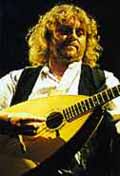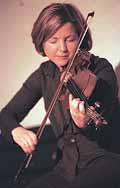 |
||
The Living Tradition
|
|
|||
| Wolfstone
- Honest endeavour |
|
|||
 |
||||
|
It is some time since the press reported the demise of Wolfstone
but as has been said before, “the rumours of my demise have been
exaggerated”. In the intervening
years the pot has been kept boiling with outings of Wolfstone derived
line-ups such as ‘The Vast Majority’, and individual members
have either been busy with other musical activities or, in some cases,
been busy back at the day job. Prior to their reported demise a couple of years back, Wolfstone
had achieved the dizzy heights of success as far as their audiences and
fans were concerned, but behind the scenes they had struggled to hold
body and soul together for ten years. The band itself always drew sensible
audiences and never lost money on a tour.
They had seen a lot of people make money out of the band, but very
little of that ever trickled down to the band members.
In 1998 when they decided to ‘split’, they found themselves
not only off the road as a band, but forty thousand pounds in debt. It would be easy to describe this as a result
of poor management, but naïve management might be a better explanation.
The music business is hard and not having the benefit of management
with music industry savvy resulted in problems long after the band stopped
working. There are parallels with other bands such as Capercaillie who
now work in house managing their own careers. This is not a comment on the performance of any of the record companies
dealing with folk musicians, rather an observation that few groups, if
any, become big enough to warrant the absolute attention from a major
record label. Clearly though some
become big enough to need to keep close control of things if they are
to remain viable as professional musicians.
After the band split, they couldn’t really plan any future
work as Wolfstone whilst still under contract to Green Linnet, their American
record label, but ambitions to continue the Wolfstone story still remained.
The band realised that at some point they had to make ‘the
big decision’, whether to continue or not, but, before making that
decision about their long-term future they had to fulfill the last elements
of their contract with Green Linnet. This meant bringing out another album and the
result was ‘Seven’. Wayne McKenzie explained what happened.
“We could have just gone through the motions and made
a half-hearted attempt at an album, but we didn’t. The band and our
fans mean far too much to us to do that.
As a band we were happy with ‘Seven’, it met our expectations
of ourselves.” The financial problems continued long after the band split
with bills regularly coming out of the woodwork. These were legitimate bills for costs incurred during tours but
they usually came as a complete surprise to the band members. The mess took a long time to sort out and Wayne
is proud to point out that they now don’t owe anybody anything. “When we realised the extent of the problems,
I personally phoned everybody and said ‘we have a debt and we will
pay it. How can we work it out?’ It took us three and half years to sort it
out - but we did it.” At this point, having escaped from their financial and contractual
obligations, they were in a position to make a fresh start. They had made the decision to carry on when
Andy Simmers (Keyboards/Piano) died, the second such tragedy to strike
the band. There was much soul
searching but fan encouragement, which had played a big part in their
tale over the last fifteen years, was a major factor in them deciding
to get back on the road. Second time around the band have an air of confidence. They have learned lessons but that has not
dampened their vision for the band in any way.
“The future is our own. We
could have walked away and not owed anybody anything but we decided to
carry on. We don’t have anybody telling is what
we can or can’t do. Conventional
wisdom might tell us to cut down on the staging of our concerts and concentrate
more on studio work but Wolfstone ‘live’ is what we are all
about. This is why we decided to do the live album
that many of our fans have always asked for.”
The ‘live’ album, ‘Not Enough Shouting’, is an important element of their plan to re-establish the
band as a touring unit and the band is pleased with the result. This time the album is on their own label,
Once Bitten Records, where they will have control over promotion and be
able to maximise the impact of sales at gigs. They also have plans for
a studio album, which they intend recording in December and January /
February and some of the material for that album will be previewed in
tours. Living in the Highlands the band has long distances to travel
even before they start a tour. Second
time around this has resulted in a fresh approach to touring.
The band now intends to concentrate on concise tours, even in Scotland
where they will allocate a tight six-week schedule and then do no more.
From June and July the ball should be rolling and Wolfstone will
be back on a full-time basis. "We
have not ignored England this time, it didn’t really work there in
the past for various reasons and as we still don’t have an agent
there, we will do all the planning ourselves and this time around we will
be trying a two / three week tour around December.
Also in the touring schedule for the latter half of 2001 are
Scandinavia, Germany, Spain, pretty much most of Europe, and of course
we have scheduled a tour in Scotland.
These are the places that were still good for us when we were going
through the tough times and because of that we are concentrating there
first. Next year we will be going to the States where
it has always been good. Every
tour there was not only an amazing experience but all the gigs, whether
they were big festivals or in a club were great." Wolfstone are one of the few bands that have taken the folk-rock
genre forward. They occupy the
sparsely populated ground on the fringes of the rock world, their closest
neighbours probably being Run Rig. The
current line up of the band is Duncan Chisolm, Stuart Eaglesham, Wayne
Mackenzie, Stevie Saint and Tony Soave.
They remain happy to be called a folk band but see Celtic Rock
more as a label. “We are
as much a folk band as we ever were, Duncan is the strong traditional
influence, but we all come from different musical backgrounds.”
The background to the band is well documented. In 1989 Duncan Chisolm found himself recording
a solo album in his native Scottish Highlands. Until this point, although having interests
in most styles of music, Duncan had been a first-class exponent of the
traditional Scottish Highland fiddle style, studying under the expert
tutelage of the late Donald Riddle. Making
the album and surrounded by an array of studio toys, he began to see the
means to scratch the itch that had begun to bother him for some time.
Duncan had met Stuart Eaglesham at a session in a local pub
and a short time later the idea of a band was born. Stuart`s brother Struan, working on the west coast at the time and
playing keyboards was given a similar offer and piper Alan Wilson from
Bonar Bridge came in to add to Duncan’s focus on the tunes. Roger Niven, from Avoch on the Black Isle,
provided lead guitar but was soon replaced by Andy Murray. A couple of years later the
songwriting talents of Orcadian, Ivan Driever completed the embryonic
Wolfstone line-up who, with sequenced drums and bass, performed their
launchpad gig at the first Highland Traditional Music Festival held in
Dingwall in 1989. They then embarked on what was to become several interesting
years of playing the village halls up and down the length and breadth
of the Highlands and Islands and then, with their teeth well and truly
cut, were offered their first recording contract with the Lismor/Iona
record label in Glasgow. This gave them an opportunity to work with the legendary Silly
Wizard accordion virtuoso Phil Cunningham as producer and resulted in
their first album ‘Unleashed’. The
album saw both a musical step forward and a chance to cast aside the drum
and bass sequencer and work with a real drummer and bassist in the shape
of John Henderson and Neil Hay. During
the recording, the band was offered a support slot on the Runrig stage
at Loch Lomond near Glasgow. The exposure to and experience of playing
in front of the huge audience saw the band catapulted onto a new level
of touring and playing larger gigs and festivals, not only in the UK but
increasingly in Europe, North America and Canada. The follow-up album
‘The Chase’, in 1992, saw the band build upon the success
of ‘Unleashed’ with more and more tours and also work in TV. This time the roles of John Henderson and Neil
Hay were covered by Mop Youngson on drums from Aberdeen and Wayne Mackenzie
on bass from Inverness. Both ‘Unleashed’
and ‘The Chase’ went silver and gold respectively. Piper Alan Wilson left the band in 1992 to be replaced at various
intervals by a series of fine musicians including Roddy McCourt, Gordon
Duncan, Dougie Pincock, Gary West, Kenny Forsyth, Duncan MacGillivray,
Martyn Bennett, Fraser Fifield,
Graham Mulholland and eventually Stevie Saint from Pitlochry. Guitarist Andy Murray also went on to other
things just prior to the band entering into a new recording contract with
American label Green Linnet records in 1993. The guitarists’ role on the first album for Green Linnet,
‘Year of the Dog’, was jointly taken by both Stuart and Taj Wizcowski, a respected
session player. This was also
the third collaboration with Phil Cunningham on production duties. After the release of ‘Year of the Dog’ the band saw no let up in their hectic
touring schedule which took them on several tours and festival appearances
in North America, Canada and Europe. Shortly afterwards, Wolfstone as a touring and recording entity,
for various reasons, took a similar decision leading to the news of their
breakup although they continued to fill contractual obligations in the
form of dates already booked throughout 1998/9. Aberdonian Ronnie Simpson filled the then vacant drum seat for this
wind-down period and Andy Simmers from Inverness played keyboards. During this time Green Linnet released a compilation
album entitled ‘Pick of the Litter’ in 1997 and then a project
by Ivan Drever & Wayne Mackenzie called ‘This Strange Place’
which unfortunately Green Linnet released as a Wolfstone album. In the Autumn of 1998 the band agreed to record
and fulfil the last option of their contract with Green Linnet and in
December 1998 through to January 1999 Wolfstone recorded, along with new drummer Tony Soave what was to become ‘Seven’. Throughout this interview, Wayne used the phrase "in a
structured businesslike way" several times. This in no way indicates any sell out to commercialism. They are still living in the Highlands, they
are 100% committed to what they want to do artistically, but wise enough
to know they have to get the business aspects right this time if their
artistic vision is to be achieved. Check out their progress towards that ' vision' at - www.wolfstone.co.uk Pete Heywood |
||||
| Related Links |



